CALL US! 1-415-766-2722
Fun@SanFranciscoJeepTours.com
The Golden Gate Bridge is not just an engineering marvel; it’s a symbol of beauty, innovation, and a striking color that defies convention. The story of the bridge’s iconic hue is a fascinating one, full of practical decisions, artistic vision, and one very lucky “happy accident.”
Let’s dive into the history, fun facts, and the most asked questions about the accidental color of the Golden Gate Bridge.
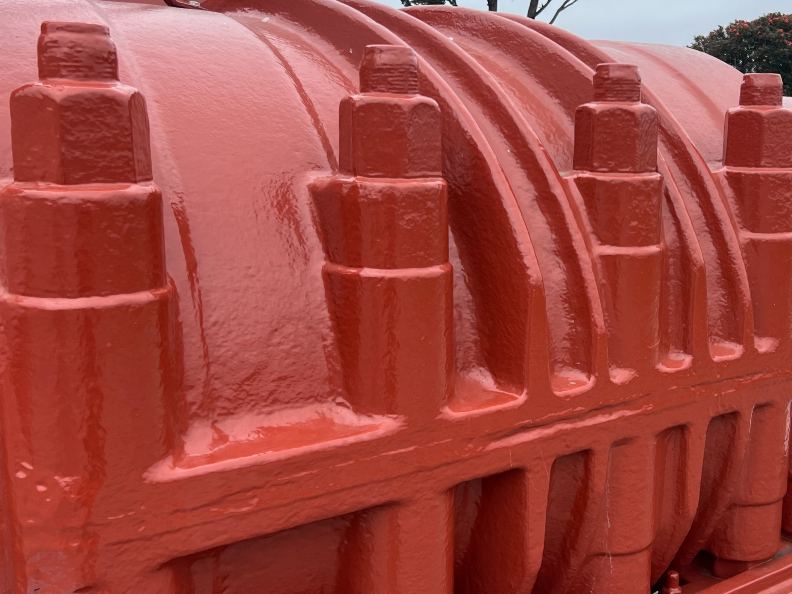
Skimmer tip:
Jump to the FAQ for quick answers, or the Myths section for the stories people often get wrong.
In the early stages of planning the Golden Gate Bridge, the U.S. Navy proposed a yellow and black stripe color scheme. This combination was intended for navigational purposes, since such colors were commonly used to enhance visibility for passing ships, particularly in foggy conditions. The U.S. War Department supported this choice.
This proposal might have turned the Golden Gate Bridge into a buzzing bumblebee-like structure. The practicality was clear, though, given the steel construction and the need to prevent rust and corrosion caused by ocean air and San Francisco’s characteristic fog. But destiny had a different hue in mind.
Irving F. Morrow, the consulting architect of the Golden Gate Bridge, noticed a reddish-orange primer being used on some of the steel during construction.
Recognizing the visual appeal of this color against the backdrop of the bay’s hills, ocean, and sky, Morrow championed the idea of painting the bridge in this unique shade.
The result was the iconic International Orange—a hue that would become synonymous with the bridge itself.
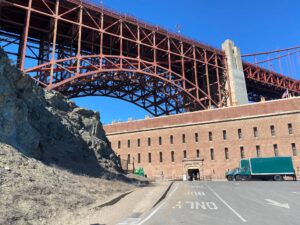
The selection of International Orange was a daring departure from the norms of the time. Most bridges were painted in subdued shades of gray, silver, or black.
Morrow’s vision aimed to harmonize the bridge with its surroundings while keeping it visible in the fog.
The bridge’s color choice wasn’t instantly approved. Morrow had to convince the Department of War (the permitting agency at the time) that the vibrant hue was a fitting choice. The Navy’s black-and-yellow striped idea and the Army Air Corp’s red-and-white striping proposal created a lively debate.
Ultimately, Morrow’s advocacy for International Orange won out, and the unique hue became part of the bridge’s identity.
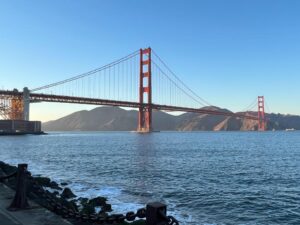
The name “Golden Gate Bridge” might make you think the bridge was intended to be gold, but the name comes from the Golden Gate Strait—the entrance to San Francisco Bay from the Pacific Ocean.
The confusion between the name and the color has persisted ever since.
Contrary to popular misconceptions, the bridge is not painted once every seven years or repainted from end to end on a continuous loop.
Instead, maintenance crews perform ongoing inspections and touch-ups year-round, repainting sections as needed to protect the steel.
The Golden Gate Bridge’s paint system has evolved over the years to handle corrosion concerns and meet changing regulations.
It began with lead-based paint, transitioned to an inorganic zinc silicate primer with vinyl topcoats by 1968,
and later replaced the vinyl topcoat with an acrylic emulsion to meet air quality requirements.
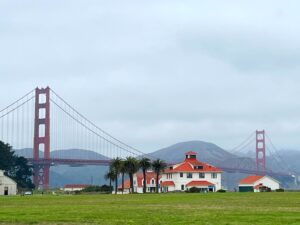
Maintaining the Golden Gate Bridge’s appearance is no small feat. Skilled crews replace corroded steel, touch up paint, and keep the structure protected from the elements.
Fog, wind, salt, and sun make their job tough—but they’re a big reason the bridge looks iconic year after year.
The Golden Gate Bridge stands as a testament to human ingenuity, artistic vision, and the marriage of engineering and art. Its accidental color—International Orange—defied convention and transformed the bridge into a global icon.
Want to appreciate the color in real life? Try a few viewpoints—International Orange looks different depending on fog, sun angle, and what’s behind it.
Want parking, access tips, and photo locations?
Golden Gate Bridge – Information on access, parking, weather, photo locations and more.
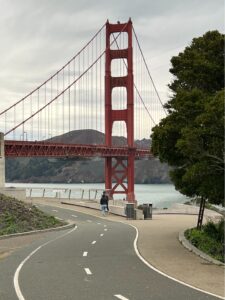
The Golden Gate Bridge may be one of the most photographed structures on Earth—and its color is a huge part of why it stands out so dramatically against the bay, fog, and sky.
Here are the most useful, high-intent questions (and straight answers) for travelers.
Short answer: It’s not red.
The Golden Gate Bridge is painted a custom version of International Orange,
chosen to stand out in San Francisco’s fog and complement the surrounding water, hills, and sky.
It started as a happy accident.
International Orange was originally applied as a primer on some of the steel during construction. The team noticed how well it contrasted with the bay and fog,
so the shade was refined and officially adopted instead of the standard gray or black used on many bridges at the time.
Not all at once.
The bridge is not repainted from end to end on a continuous loop. Crews perform constant inspections and touch-ups year-round,
repainting sections as needed to protect the steel from weather and salt air.
No—that’s a long-standing myth. Instead of painting the entire bridge in a continuous cycle, inspectors rank areas by priority and crews focus on the sections that need attention most urgently.
The myth likely traces back to the bridge’s early years, when large portions needed repainting soon after the original coating. Over time, that reality morphed into the exaggerated story that crews simply start at one end and never stop.
Early accounts commonly cite about 110,000 gallons of paint for the original coating when the bridge opened—one reason the “end-to-end repainting” story grew legs.
The bridge sits in a harsh coastal environment with constant fog, salty ocean air, strong winds, and UV exposure. Paint isn’t just cosmetic—it’s essential corrosion protection for the steel.
Painting operations involve a sizable team—often cited as roughly 42 workers across multiple roles (inspectors, ironworkers, electricians, sandblasters, and painters).
Modern systems rely on multiple coats, each with a specific job—corrosion resistance, durability, and UV protection. A single-layer approach doesn’t hold up well in San Francisco’s foggy, salty climate.
Yes—lighting changes everything.
Fog, sunlight, camera settings, and filters can make the bridge look more red, more orange, or even brownish. Sunrise and sunset often produce the richest, most dramatic tones of International Orange.
Close matches are available.
The bridge uses a proprietary paint system, but many brands sell International Orange-inspired shades.
For the most accurate specs and references, the bridge’s official website publishes color information and styling details.
Reality: Paint is the bridge’s first line of defense against rust and corrosion. In San Francisco’s fog-and-salt environment, the paint system is essential protection for the steel.
Reality: The bridge’s environment is so demanding that paint systems have been updated over time. The current approach relies on specialized coatings designed to handle salt, fog, wind, and UV exposure.
Reality: The formula stays consistent, but your eyes don’t get a consistent environment. Fog density, sun angle, haze, and moisture can make International Orange look more red, more orange, or deeper and moodier—sometimes within the same day.
Reality: Fog influences how painting happens. Conditions like humidity and weather cycles can dictate when certain coatings can be applied successfully.
Reality: Painting is part of a bigger process—inspection, surface prep, corrosion control, and careful section-by-section work to keep the structure protected.
Reality: Crews use specialized tools to reach complex steel sections safely, including angled brushes on long poles for tricky spots.
The vibrant and unmistakable hue of the Golden Gate Bridge’s International Orange isn’t just a happy accident; it’s a carefully crafted color with its own formula and codes.
Curious minds have wondered for years how to match it, and the truth is out in the open.
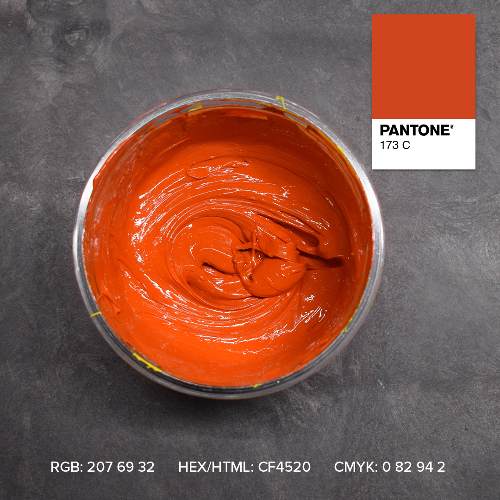
The color formula for International Orange is publicly referenced on the official
Golden Gate Bridge website. It’s like the magician showing the trick—because the color is part of the bridge’s story.
When it comes to applying that signature color at bridge scale, it’s not a casual trip to the paint store.
The paint is specially ordered and matched to meet project specifications.
A close off-the-shelf Sherwin Williams color is Fireweed (SW 6328).
Close, but not quite Golden Gate Bridge close.

If you want to mix a close version yourself, some paint stores can create a custom batch using this CMYK starting point:
Cyan 0%, Magenta 69%, Yellow 100%, Black 6%.
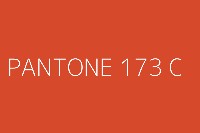
Closest existing codes commonly referenced include:
PMS 173 (CMYK 0%, 80%, 94%, 1%),
PMS 174 (CMYK 8%, 85%, 100%, 34%),
and Pantone 180 (CMYK 19.4%, 77.9%, 79.6%, 3.6%).
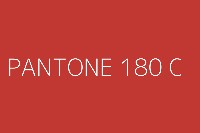
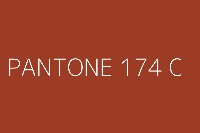
Armed with these codes, you could potentially color the world in Golden Gate Bridge chic.
But there’s only one true International Orange—draped across the iconic span at the entrance to San Francisco Bay.
Wondering how best to experience the Golden Gate Bridge?
San Francisco Jeep Tours includes a ride over the Golden Gate Bridge in every tour package.
From day trips to Muir Woods to the full San Francisco city tour, the Golden Gate Bridge is stunning from the backseat of a Jeep.
Check out more Golden Gate Bridge info to plan your perfect visit:
